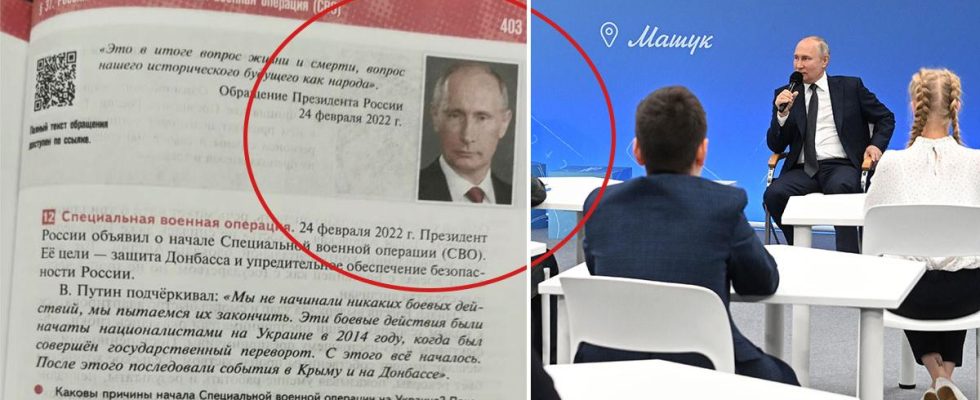Updated 14:38 | Published at 2:16 p.m
Russia’s 40,000 schools are to become even more propagandistic this fall.
The school year begins with the students seeing a video in which Vladimir Putin is a teacher.
His message to the children: learn to love Russia.
Since September 1 last year, propaganda lessons are mandatory in Russian schools. Every Monday now begins with the national anthem and flag raising and a so-called “conversation about important things”, that is, a lesson where the teacher spreads Putin’s world view.
As the new Russian school year started on Friday, the country’s president gave a propaganda speech to 30 selected top students at a school outside Moscow. Tomorrow, the video of the conversation will be shown in schools across Russia:
– I know why we won the Second World War. Because it is impossible to defeat a people with such an attitude. We were totally invincible then and are still the same, Putin said according to the Ria Novosti news agency and explained that the purpose of the Monday talks is for the students to learn to “love Russia”.
Since last Friday, the Russian Duma’s law that all schools must follow exactly the same curriculum also applies. The curriculum stipulates, among other things, that the goal of the lessons in the Russian language is for the students to “gain a conviction and readiness to serve and defend the motherland, and to feel responsible for its destiny”, according to the BBC.
On the subject of Russian literature, the books of the famous Russian science fiction brothers Boris and Arkady Strugatsky are discarded in favor of a story by Zachar Prilepin, a writer who glorifies the war in Ukraine.
Must monitor the mood among the children
Most Orwellian will be the teaching for the teenage students in the 10th and 11th grades, who will receive a new history book this fall. Among other things, it says the following about the war in Ukraine:
“Our soldiers – who are categorically ordered to never, ever shell civilian neighborhoods – encountered an unprecedented NATO tactic at the beginning of the military special operation. The Ukrainian army did not protect its inhabitants, did not fortify the cities, but on the contrary – they occupied positions in civilian quarters and did not allow the inhabitants to leave them. In other words, they used their own residents as hostages, as “living shields”. No army in history has ever used such a hideous tactic on its own territory. You are already adults, dear upperclassmen. Draw your own conclusions from Ukraine’s new military tactics.”
The propaganda may not reach all of us. A mother in Russia tells the newspaper Meduza anonymously how the 16-year-old son acts at school if he ends up in a propaganda lesson:
– He puts on his headset and listens to music. So do 90 percent of the class, she claims.
But since the invasion, the teachers at many schools have been increasingly looked after by the school management:
– The class teachers are told to monitor the mood among the children. For example, if someone hears a student singing a Ukrainian song, the student is taken to a conversation with the class teacher, a psychologist and a social worker who say: “Dear children, you probably heard that song by accident, but the official party line is another. And we don’t want there to be any problems for your parents”, says an anonymous teacher in Moscow to Meduza.
According to another anonymous teacher, interviewed by the BBC, the new curriculum and textbooks are just a show of “political loyalty” on the part of the Russian Ministry of Information. In practice, their edicts will not be followed in all Russian schools.
Aleksandr Kondrashov, a member of the Teacher’s union, tells the BBC:
– The school is a conservative structure. What is written on paper almost never corresponds to what goes on in the classrooms.
Several other teachers, who are opposed to the war, tell Meduza that they do not follow the state’s mandate about what “conversations about important things” should contain.
